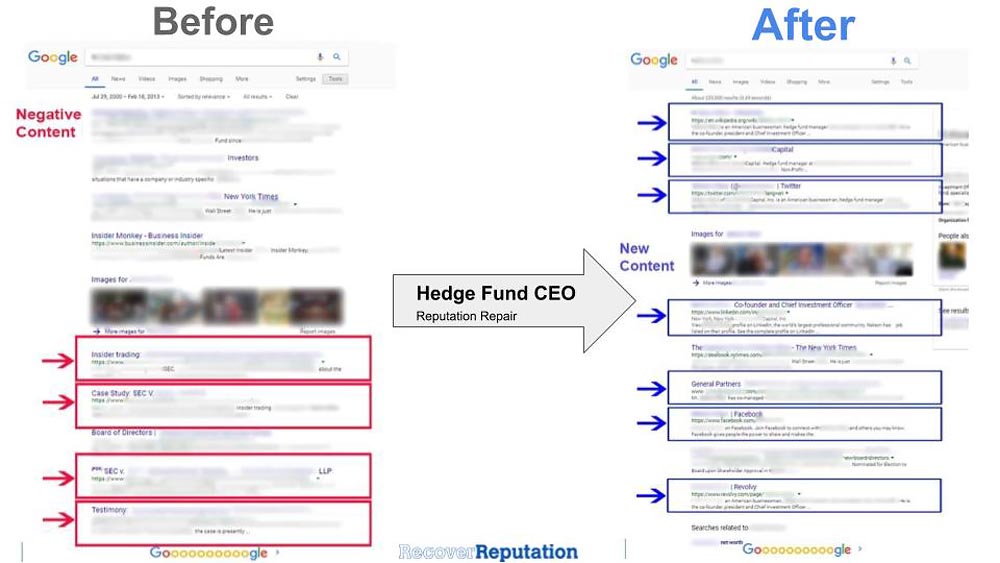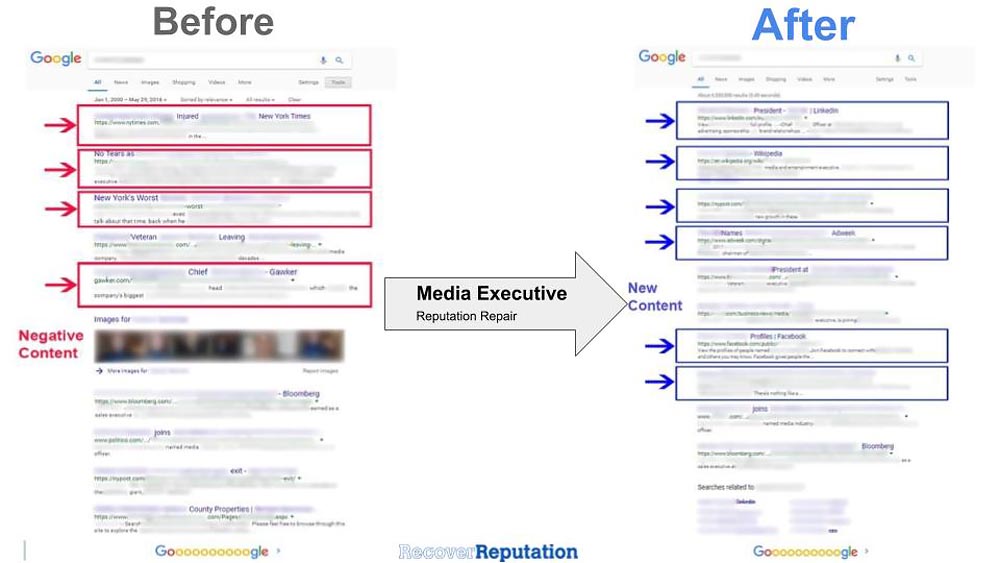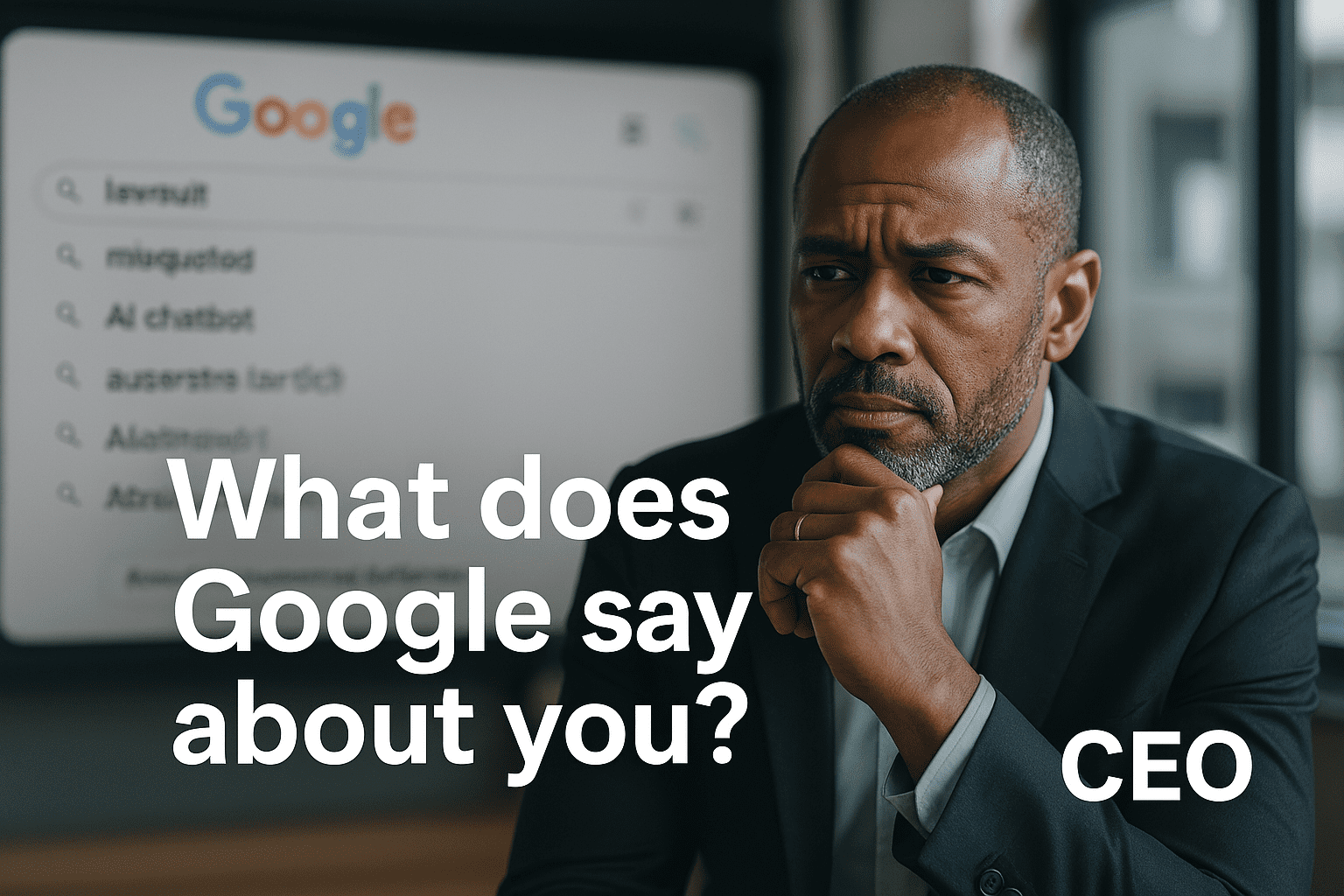Last Updated on November 22, 2024 by Steven W. Giovinco
Introduction
In today’s digital age, a CEO’s online reputation isn’t just about personal pride—it’s a critical business asset. Your personal brand shapes how investors, employees, and customers perceive your leadership. One viral tweet or damaging headline can disrupt years of hard work.
This guide will show you how to proactively manage your reputation, protect your image, and maintain trust in 2024.
Summary
- A CEO’s online reputation directly impacts investor confidence, customer trust, and employee morale.
- Problems happen—how you handle them can make or break your image.
- Proactively manage your reputation with a personal website, thought leadership content, and social media engagement.
- Transparency, authenticity, and timely responses are key to building trust and ensuring long-term success.
Why Your CEO Reputation Can Make or Break Your Business

- A CEO’s reputation is critical to company success, shaping perceptions among investors, employees, and customers.
- Negative events—like a bad tweet or damaging news article—can hurt both personal and business credibility.
- Clients and investors often choose companies based on the CEO’s reputation.
How Online Reputation Shapes Company’s Success?
As a CEO, your online reputation is a massive part of your company’s success. It’s not just about how people view your business; it’s how they see you.
Whether you’re in the headlines for all the right reasons or trying to navigate a damaged online reputation, your personal brand is out there shaping how people—employees, investors, customers—perceive your leadership.
In this article, I aim to show you why it matters and help you build, protect, and grow that reputation in a way that’s genuine and proactive. It’s a long slog, but it works.
What is the Cost of a Poor CEO Reputation?
Your reputation as a leader directly affects your firm’s bottom line. One negative news article, or even a tweet taken out of context can go viral—and not in a good way, since with social media, everyone’s watching. And when that happens, it’s not just your name that suffers—your company’s credibility, sales, and team morale take a hit, too.
Would You Trust a CEO with a Bad Reputation?
Think of it from a client’s perspective: would they invest in a company whose CEO has a questionable online reputation?
They would just move on to a competitor. So, not actively managing your reputation means you’re leaving a lot of your company’s future up to chance or exposure to potential damage.
What is the Direct Link Between Reputation and Business Success?
The impact of a CEO’s reputation on a company’s bottom line is profound and multi-faceted.
A CEO’s reputation is often directly linked to investor confidence, employee retention, customer loyalty, and overall business success. Here’s some more details:
1. Investor Confidence and Stock Performance
- A positive CEO reputation significantly affects investors’ perception.
- Up to 44% of a company’s market value is attributed to the CEO’s reputation, according to Weber Shandwick.
- When a CEO is trusted and respected, investors are more likely to buy or hold onto shares, which in turn drives up the company’s stock price.
- On the other hand, a scandal or negative press quickly leads to a stock dip and a loss of market confidence.
2. Sales and Revenue Growth
- A CEO’s public image directly impacts customer trust.
- Consumers are more inclined to buy from companies whose leadership they have faith in.
- Research suggests that 75% of customers base their purchasing decisions on the company’s leadership, including the CEO.
- CEOs who are perceived as ethical, transparent, and socially responsible fosters loyal customers, which leads to growth.
- However, negative search results around the CEO can damage customer trust, leading to reduced sales.
3. Talent Attraction and Employee Morale
- A CEO’s reputation is critical when attracting and retaining talent.
- Surveys show that 71% of job seekers will avoid companies with negative reputations.
- A positive CEO image helps in recruiting top-tier talent, which is essential for innovation and growth, especially for smaller firms.
- Also, a well-regarded CEO boosts employee morale and productivity, which directly affects overall business performance.
- A CEO perceived as distant or controversial can lead to higher employee turnover, resulting in increased recruitment and training costs.
4. Cost of Online Reputation Management
- A poor reputation often leads to crises, which comes with high costs.
- Companies spend millions on crisis management, public relations campaigns, and damage control when their CEO’s actions or statements generate bad press.
- Online reputation recovery is costly—not just in terms of immediate financial resources but also in long-term brand rebuilding.
- Real-world online reputation management prices range from $4,000 to $20,000 per month, for six to 12 months, depending on severity.
- The time spent addressing these issues also is a distraction for the CEO, and takes the focus away from the core business.
5. Long-Term Business Sustainability
In the long run, a CEO’s ability to inspire trust and lead ethically creates a foundation for business sustainability.
The impact of maintaining a strong personal and corporate reputation helps protect the company from both market volatility and competitive pressures, ensuring steady growth over time.
In short, a CEO’s reputation affects almost every aspect of a company’s success—from stock prices and sales to talent retention and crisis costs.
For a company to thrive, its CEO must be proactive in managing both their personal and professional image, as it directly ties into the business’s financial health.
What to Do When Your Web Reputation Is Damaged?
No matter how careful you are, issues happen. It could come from an unethical competitor, an incorrect news story, or a genuine mistake that gains traction online.
When a crisis hits, the way you handle it matters just as much as the event itself.
- Own Up to Mistakes: If there’s truth to the negative publicity, be transparent. Acknowledge the mistake and outline the steps you’re taking to fix it. A heartfelt apology can do wonders.
- Correct Misinformation: If the story is false or exaggerated, act fast. Contact the source directly, clarify the facts, and work to have the misinformation corrected or removed.
- Push Positive Content: In times of crisis, flood the web with positive content. Publish articles, share success stories, and engage with your audience to help drown out the negativity. We’ll go into a deep dive below.
Step-by-Step Guide to Repairing Your CEO Reputation

How can you take control of your online reputation?
- Develop a Strategy: Define your tone, align your values with your online presence, and stay consistent to avoid further damage.
- Create a Personal Website: Highlight achievements, share thought leadership content, and control your narrative to humanize your brand.
- Be Active on Social Media: Engage meaningfully on platforms like LinkedIn, X/Twitter, Quora, and Reddit while avoiding self-promotion.
- Write Expert Articles and Whitepapers: Share insights, case studies, and deep dives to establish authority and credibility.
- Share Business and Personal Photos: Balance professional updates with authentic personal moments to connect with your audience.
- Monitor and Protect Your Reputation: Use tools like Google Alerts to track mentions, respond quickly, and amplify positive content.
Tasks for the CEO:
- Engaging with Stakeholders: Respond personally to critical comments or queries from investors or major partners. A direct response from the CEO can rebuild trust quickly.
- Posting on Social Media: Write authentic, personal posts on LinkedIn to share leadership insights and updates, emphasizing transparency and vision.
- Networking with Influencers: Connect and engage with industry leaders, speaking at events or joining podcasts to reinforce credibility.
Tasks for the Team:
- Monitoring Online Mentions: Assign a team member to use tools like Google Alerts, Hootsuite, or Mention to track references to the CEO or company online.
- Content Creation: Have the marketing team draft blogs, whitepapers, and social media content for the CEO’s review, ensuring alignment with their voice and branding.
- Reputation Repair: Delegate ORM tasks to improve the ranking of positive content or hire a ORM firm to handle media outreach and damage control.
1. Develop a Strategy
- Who are you?
- What is your personality?
- What is your tone–casual, professional, conversational, jovial, etc.?
2. Create a Personal Website
Next, to repair a damaged reputation, create a personal website. This is your space to showcase your leadership journey, share your values, and control your own narrative. You can use this platform to post your own content, such as blog posts, videos, and whitepapers, to establish yourself as an expert in your field. It lets people know who you are—beyond the CEO title—and what you stand for. Include achievements, press mentions, interviews, and even photos of speaking engagements or community work. Humanize yourself.Example Website Structure:
Homepage:- Professional photo and short bio.
- Tagline emphasizing leadership philosophy (e.g., “Innovating with Integrity”).
- Career highlights, personal values, and leadership style.
- Education
- Headshot and more detailed bio.
- Regular posts on industry insights, company milestones, or leadership lessons.
- Post monthly or more.
- Links to interviews, press releases, or articles featuring the CEO.
- Form or email for professional inquiries.
- List other platforms
- Include a real address.
3. Be Active on Social Media Platforms
Be constantly active on LinkedIn, X/Twitter, Quora, Reddit, Medium, Instagram as well as ones in your particular niche. These aren’t places to promote company updates—they’re tools for directly engaging with your audience, sharing your thoughts on business trends, and building relationships.- LinkedIn: This is a must for every CEO. Regular posts, articles, and comments can help position you as a thought leader.
- X/Twitter: Great for sharing quick insights and connecting with industry peers and customers/clients. Retweet good info, and occasionally, post your blog article links.
- Quora: Answering questions relevant to your industry shows that you’re approachable and knowledgeable.
- Reddit: You can participate in discussions in industry-specific subreddits. This personal interaction builds credibility. Never self-promote! You will get slammed and “downvoted.”
4. Write Expert Articles and Whitepapers
Position yourself as a thought leader by publishing expert articles and whitepapers. Dive deep into industry-specific topics, offer new insights, or share case studies from your own experiences. This not only strengthens your personal brand but also boosts your company’s reputation by association. Whitepapers, in particular, show that you’re not just a leader—you’re an expert who understands the future of your industry. You can publish these on your website, share them on LinkedIn, rewrite for Medium or even partner with industry publications for more visibility.5. Share Photos—Both Business and Personal
Don’t be afraid to share personal moments. Authenticity goes a long way in building trust. Photos of business events like speaking engagements or team-building exercises are great, but sprinkling in moments from your personal life—whether it’s a family vacation or a charity event—helps people see you as a well-rounded person, not just a corporate figure. This is where platforms like Instagram and Facebook can come in handy. While it’s easy to get caught up in just promoting business content, showing the human side of yourself is what really helps people connect with you.6. Monitor and Protect Your Reputation Proactively
You can’t fix what you don’t know about. Setting up Google Alerts for your name is a simple, free way to stay on top of what’s being said about you online. If your name pops up in an article or social post, you’ll know about it right away and can respond quickly.Ready to Regain Control of Your Online Reputation?
Get in touch with us today for a free consultation. Let's work together to restore your online reputation and get your life back on track.
How CEOs Rebuilt Their Online Reputation: Case Studies

Repairing the Reputation of a New York Hedge Fund CEO
The Problem
We had a situation where an ex-investor became upset about a deal that didn’t go the way he wanted.
In response, he posted a scathing, personal attack on RipoffReport. This post shot straight to the top of Google search results for both the hedge fund and its CEO. As you can imagine, this severely impacted their sales and led to investors pulling out. Legal action had been tried, but it was costly and ultimately ineffective, so that’s when we stepped in to repair the damage.
The Solution
After analyzing the situation, we jumped into action:
- Created and published well-researched financial content across targeted business platforms to rebuild credibility.
- Made a personal website for the fund’s owners, which was launched to showcase their expertise and history in the financial industry.
- Optimized the fund’s business website by adding SEO-friendly tags, renaming pages, and developing a compelling bio page to ensure it ranked higher in search results.
- Developed profiles on hedge fund and investment-focused platforms, ensuring they were positioned to attract the right kind of investors.
The Result
Within five months (it normally takes much longer), the negative post was buried deep in search results, restoring trust in the hedge fund and turning things around for their business.

Reinventing the Reputation of an Entertainment CEO
The Problem
An entertainment CEO approached us with a career problem that stemmed from an incident nearly 20 years ago.
Despite having a stellar career in the media and entertainment industry—consistently doubling sales wherever he worked—a holiday party incident resurfaced online, and it was costing him new job opportunities.
He had even signed an employment agreement, only to have it canceled when someone found the old articles. He was essentially “untouchable.”
The Solution
We dove into active discussions and research, and here’s what we did:
- Crafted strong online presences on key media-related platforms like IMDB, Instagram, YouTube, and Crunchbase.
- Resurfaced important articles from high-profile publications, such as the New York Times and relevant industry magazines, ensuring his name was prominently featured.
- Shared this positive content frequently on business-related sites to outshine the old stories.
- Boosted his image by building relationships with influential figures in his industry to get more positive exposure.
The Result
In six months, the negative articles were pushed down, and his reputation was successfully repaired. Soon after, he secured a new executive position in the industry.
How Much Does CEO Reputation Management Cost?
Prices vary widely and depend on the severity of the issue. However, generally, most issues cost about $2,500 to $5,000 per month for about six months.
| Plan Type | Visibility | Monthly Cost | Included Features | Minimum Duration |
|---|---|---|---|---|
| Minimal | Low Visibility | $1,500+ | – Analysis- Blog Creation- Platforms- Engagement- Weekly Updates | 3 months |
| Average | Mid Visibility | $3,750+ | – Analysis- Blog Creation- Platforms- Engagement- Articles- Images- Videos- Website- Posting- Daily Updates | 6 months |
| Complex | High Visibility | $6,500+ | – Analysis- Blog Creation- Platforms- Engagement- Articles- Images- Videos- Website- Posting- Daily Updates | 10 months |
| Removal | Low Visibility | $750+ | – Removes 1 Negative Item | N/A |
Appendix: How to Write a Public Apology Statement?
When a CEO must address a crisis, a well-crafted apology can make all the difference. Provide a template like this:
Example Template:
Subject Line: Taking Accountability: A Message from [CEO Name]
Dear [Audience/Stakeholders],
I want to address [specific issue] and take full accountability for the impact it has caused. [Briefly describe the situation, acknowledging what went wrong without deflecting blame.]
At [Company Name], our core values are [value 1], [value 2], and [value 3], and we understand how this incident may have undermined the trust you’ve placed in us.
Here’s what we’re doing to address it:
- [Action 1: Immediate correction or reparation].
- [Action 2: Long-term preventative measures].
We are committed to doing better. Thank you for your continued trust and support.
Sincerely,
[CEO Name]
Summary of Key Points for CEOs Managing Their Online Reputation
- Investor Confidence and Stock Performance:
Your reputation as a CEO can influence up to 44% of your company’s market value. Positive press builds investor trust, while scandals lead to stock dips. - Sales and Revenue Growth:
A CEO’s public image affects customer trust. Ethical and transparent leadership fosters loyalty, driving revenue, while negative publicity damages sales. - Talent Attraction and Employee Morale:
Job seekers avoid companies with poor reputations. A strong CEO image helps recruit top talent and boosts team productivity. - Cost of Online Reputation Management:
Recovering a damaged reputation can cost $4,000–$20,000 per month over several months. Preventative management saves resources in the long run. - Long-Term Business Sustainability:
Ethical and trustworthy leadership builds a strong foundation for navigating market volatility and securing steady growth. - Own Up to Mistakes:
If you’ve made an error, transparency is critical. Acknowledge it, apologize, and outline corrective actions to rebuild trust. - Correct Misinformation:
Address false or exaggerated stories promptly. Contact the source, clarify the facts, and work to have inaccuracies removed or countered. - Push Positive Content:
Flood the internet with success stories, thought leadership articles, and engaging social media posts to drown out negativity. - Leverage Personal Branding:
Create a personal website, engage on platforms like LinkedIn, and publish content that showcases your leadership and expertise.
Conclusion
A CEO’s online reputation is an invaluable asset that can drive or derail business success. By proactively managing your personal brand and addressing challenges head-on, you can ensure your leadership inspires trust, loyalty, and growth.
Recover Reputation is here to help—start protecting what you’ve built today.
Ready to Protect Your Reputation? Contact Us Today
At Recover Reputation, we understand the unique challenges CEOs face when it comes to managing their personal brand. Whether you need help setting up your personal website, writing thought-leadership content, or handling a reputation crisis, we’ve got your back.
Let’s protect what you’ve built. Reach out today for a free consultation, and let’s take your reputation to the next level.
FAQs About CEO Reputation Management
-
What is CEO reputation management?
CEO reputation management involves monitoring, protecting, and enhancing a CEO's personal brand online to maintain trust and credibility among investors, employees, and customers.
-
Why is a CEO’s online reputation so important?
A CEO’s reputation directly impacts investor confidence, customer loyalty, and employee morale. A strong personal brand can boost sales, attract top talent, and strengthen the company’s overall credibility.
-
How can CEOs monitor their online reputation?
CEOs can monitor their reputation using tools like Google Alerts, Mention, or Hootsuite to track mentions of their name and company. Social media platforms and review sites should also be checked regularly.
-
How long does it take to repair a damaged online reputation?
Repairing a CEO’s reputation typically takes 6–12 months, depending on the severity of the damage. This involves creating positive content, improving search engine visibility, and addressing misinformation.
-
What are the most effective ways to build a CEO’s personal brand?
The most effective strategies include:
- Creating a personal website.
- Publishing thought leadership articles and whitepapers.
- Engaging on LinkedIn and other professional platforms.
- Sharing authentic personal and professional stories.
-
How much does CEO reputation management cost?
Costs vary depending on the scope of work and severity of the reputation issue. Prices typically range from $1,500 to $10,000 per month for 3–12 months.
Ready to Regain Control of Your Online Reputation?
Get in touch with us today for a free consultation. Let's work together to restore your online reputation and get your life back on track.




